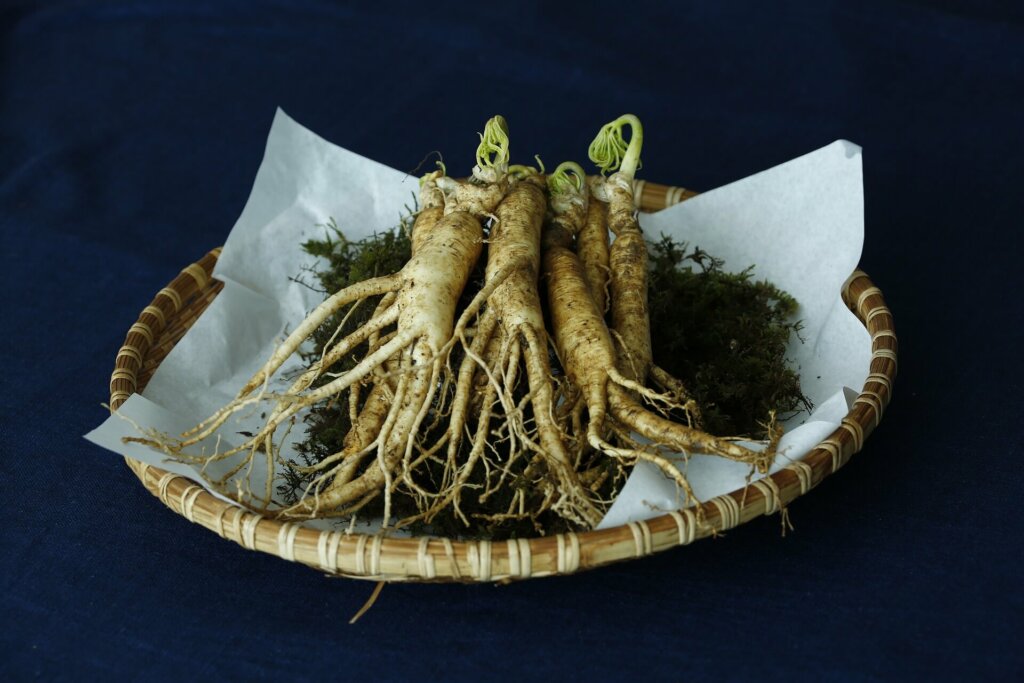Ginseng is a traditional Chinese herb that has been used for centuries for its various health benefits. This slow-growing, short plant can be classified three ways depending on how long it is grown. It can either be fresh, white, or red. Fresh ginseng is harvested before 4 years, white is harvested between 4-6 years, and red ginseng is harvested after 6 years. There are also many types of ginsengs, although the most common are American ginseng (Panax quinquefolius) and Asian ginseng (panax ginseng). Ginseng contains two compounds: ginsenosides and gintonin. Both of which have numerous health benefits.
Evidence based health benefits
- Anti-inflammatory – the ginsenoside compound in ginseng has been studied for its antioxidant benefits that help protect against inflammation in the body, and increase antioxidant capacity in the cells, helping to fend off toxins and free radicals. For example, a study in Korea found that red ginseng extracts reduced inflammation and improved antioxidant activity in skin cells from people with eczema
- May help improve brain function – in some studies, ginseng has improved brain functions such as memory, behavior, and mood. One study found that people who consumed 200mg of panax ginseng daily for 4 weeks showed improvement in mental health, social functioning, and mood.
- Boosts the immune system – many studies focusing on immunity in cancer patients found that after three months, those taking red ginseng extract had better immune system markers than those not taking ginseng.
- May fight fatigue and increase energy levels – in various studies, those taking panax ginseng experienced less physical and mental fatigue as well as reductions of oxidative stress in the body.
- Could help lower blood sugar – ginseng seems to be beneficial in controlling blood sugar levels in those people with and without diabetes. American and Asian ginseng have been shown to improve pancreatic cell function, boost insulin production, and enhance the uptake of blood sugar into the tissues.
Safety and side effects
Research has been done on the safety and efficacy of ginseng when added to the diet daily. According to this research, ginseng appears to be safe and should not product and serious adverse side effects. However, due to its ability to possibly improve blood sugar, those taking diabetes medications or insulin should monitor blood sugar closely when starting to take ginseng supplements. Studies also show that you should take ginseng in 2–3-week cycles with one or two week breaks in between.
The bottom line
Ginseng is an herbal supplement that has been used for centuries in Chinese medicine. It has many health benefits when taken daily, but most notably, its ability to reduce inflammation and provide antioxidant protection. It is also known to improve mood, fatigue, and improve blood sugar levels. Whether you want to improve certain conditions, or simply take ginseng as an overall health booster, it is worth a try. While the benefits are clear, the ability to consume ginseng can become complicated. Cooking Ginseng by itself takes time, however we have handy convenient products that contain Ginseng along with other herbal ingredients in synergistic supplements.
References:
- Lee DC, Lau AS. Effects of Panax ginseng on tumor necrosis factor-?-mediated inflammation: a mini-review. Molecules. 2011 Mar 30;16(4):2802-16. doi: 10.3390/molecules16042802. PMID: 21455094; PMCID: PMC6260618.
- Hong CE, Lyu SY. Anti-inflammatory and Anti-oxidative Effects of Korean Red Ginseng Extract in Human Keratinocytes. Immune Netw. 2011 Feb;11(1):42-9. doi: 10.4110/in.2011.11.1.42. EPub 2011 Feb 28. PMID: 21494373; PMCID: PMC3072674.
- Kim HG, Cho JH, Yoo SR, Lee JS, Han JM, Lee NH, Ahn YC, Son CG. Antifatigue effects of Panax ginseng C.A. Meyer: a randomised, double-blind, placebo-controlled trial. PLoS One. 2013 Apr 17;8(4):e61271. doi: 10.1371/journal.pone.0061271. PMID: 23613825; PMCID: PMC3629193.
- Geng J, Dong J, Ni H, Lee MS, Wu T, Jiang K, Wang G, Zhou AL, Malouf R. Ginseng for cognition. Cochrane Database Syst Rev. 2010 Dec 8;(12):CD007769. doi:10.1002/14651858.CD007769.pub2. PMID: 21154383.
- Luo JZ, Luo L. Ginseng on hyperglycemia: effects and mechanisms. Evid Based Complement Alternat Med. 2009 Dec;6(4):423-7. doi: 10.1093/ecam/nem178. Epub 2008 Jan 3. Retraction in: Evid Based Complement Alternat Med. 2020 Nov 24;2020:1698627. PMID: 18955300; PMCID: PMC2781779.

